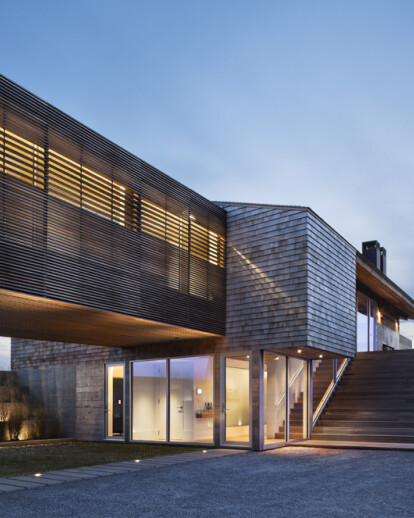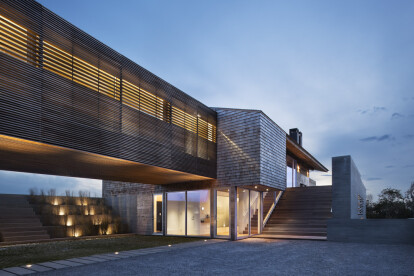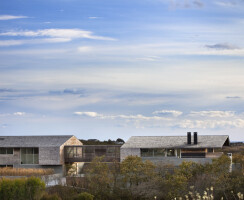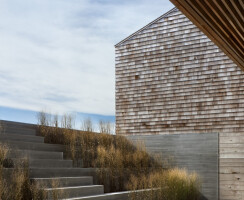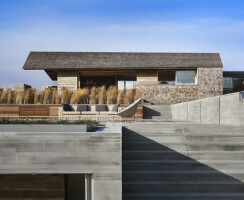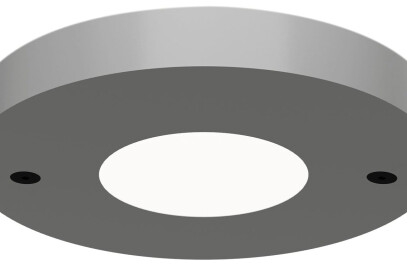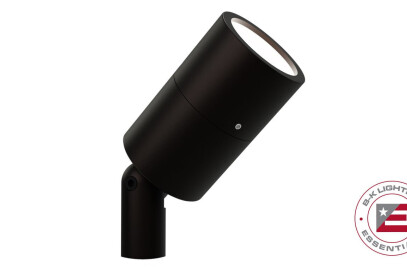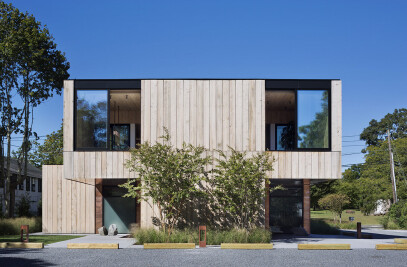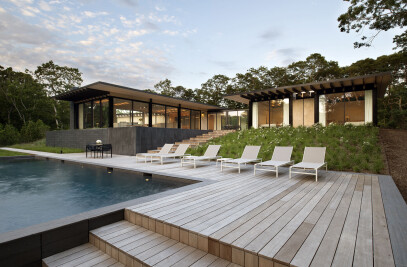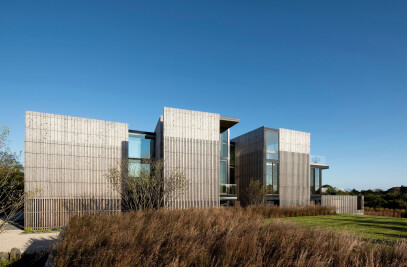Montauk, NY, may appear to be like any other small seaside community upon first glance; however, it possesses unique characteristics that imprint lasting memories. The weather is unpredictable with banks of heavy fog and gusty winds. History is closer to folklore than truth with stories of the Montauk Project Conspiracy, German Submarines and, most recently, the Montauk Monster blurring the line between fact and fiction. Structural remnants of the past such as a radar tower and bunkers are scattered throughout the landscape. Socially, there is a seasonal migration and mix of economic classes. The clients could have chosen to vacation anywhere in the world, but were lured to Montauk by the characteristics that make it unique from other areas. These characteristics embody the “Spirit of Montauk” and the clients challenged the architect to design a house that would embody and capture this spirit in the architecture.
The house responds to the site context and strengthens the “spirit of place.” Formerly a horse ranch, the rolling green pasture of the site is located at one of the highest elevations in Montauk. The extensive program is terraced and embedded into the steep slope of the hill without compromising access to the exterior or natural light. Approaching from the south, the house appears to be two modest and separate one-story ranch houses. Circling around to the north, the house unfolds to reveal a more extensive project. In this case, the conventional Montauk building typology of the low-pitched gabled roof is modified by the geometries of the allowable building envelope and height restrictions of the site. The geometric anomaly is apparent upon entry and it is unexpectedly clear that the ridge is offset and the walls converge, directing one’s view west to the lake. The optical illusion caused by the parabolic roof is visible on the South side and entices a second look, as do numerous other details.
Architectural details throughout the house occur at unexpected moments. A wood screen covered bridge unifies the two separate cedar shingle clad volumes, allowing light into the grass paver courtyard below. The cedar screen of the bridge reads differently from day to night. It appears flat during the day, but, as darkness falls, light seeps out in an undulating pattern showing the wedge shape cut in the back of the boards. In front of several clerestory windows, a milled bluestone screen is similarly detailed. The stone appears weightless as alternating stones are removed from the stone wall pattern to let light into the guest area. These unexpected details reinforce the larger idea of capturing the unexpected.
For the occupant there is no prescribed path of circulation, encouraging different encounters much like the social experiences of Montauk. One can enter beneath the bridge that frames the sky beyond and up a series of terraced planter steps revealing the pastoral rolling hills and ocean in the distance. This path draws a visitor directly into the landscape bypassing the house. One can also climb the exterior entry stair that directly connects to the interior stair, separated by a wall of glass. One can choose to enter into the house or continue the journey to the outdoor fireplace, dining area, and out to the pool. A guest staying at the house can privately come and go by a stone terrace that wraps the exterior of the guest area from the entry courtyard around to the pool without having to enter the house. The exploration resulting from unique circulation yields a different memorable experience for everyone.
The house celebrates the “spirit of the place” of where it is located. With the rise of technology and rapid transmission of information through the internet, the identity of place can be lost. This project explores regionalism and the project evolved from the community it is located.
